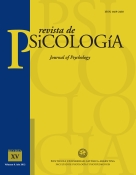Please use this identifier to cite or link to this item:
https://repositorio.uca.edu.ar/handle/123456789/6015| Título: | Efectos marco : el problema de la enfermedad de Asia en una muestra de estudiantes argentinos Framing effects : the problem of the disease in Asia in a sample of Argentine students |
Autor: | Picón Janeiro, Jimena Squillace Louhau, Mario Rodolfo |
Palabras clave: | TOMA DE DECISIONES; ESTUDIO DE CASOS; ESTUDIANTES UNIVERSITARIOS; Tversky, Amos, 1937-1996; Kahneman, Daniel; PSICOLOGIA MATEMATICA | Fecha de publicación: | 2012 | Editorial: | Universidad Católica Argentina. Facultad de Psicología y Psicopedagogía. Departamento de Psicología EDUCA |
Cita: | Picón Janeiro, J., Squillace, M. R. (2012).Efectos marco : el problema de la enfermedad de Asia en un muestra de estudiantes argentinos [en línea], Revista de Psicología, 8(15). Disponible en: http://bibliotecadigital.uca.edu.ar/repositorio/revistas/efectos-marco-problema-enfermedad-asia.pdf [Fecha de consulta:..........] | Resumen: | Resumen: El efecto marco de riesgo constituye un ejemplo de irracionalidad en la toma de decisiones. Se trata de las variaciones en las respuestas inducidas por el marco positivo o negativo en el que una tarea es presentada. El problema de la enfermedad de Asia, Tversky y Kahneman (1981), es una de las tareas diseñadas para evaluar este fenómeno. En el presente estudio se resumen los resultados de investigaciones previas respecto de este efecto y su relación con una serie de factores. Luego se exponen los resultados obtenidos en una muestra de 163 estudiantes universitarios argentinos. Estos resultados indican tanto en hombres como en mujeres, el efecto marco surge únicamente cuando la tarea es presentada negativamente: bajo esta condición los participantes tienden a elegir la opción riesgosa. Abstract: The risk framework effect is an example of irrationality in decision-making. It is the variation in the responses induced by positive or negative frame in which a task is presented. The Asian disease problem, Tversky and Kahneman (1981), is one of several tasks designed to assess this phenomenon. In the present study are summarized the results of previous research on this effect and its relation to a number of factors. Then presents the results obtained from a sample of 163 university students from Argentina. These results indicate both men and women, the framing effect arises only when the task is presented negatively: under this condition the participants tend to choose the risky option. |
Cobertura Espacial: | ARGENTINA | URI: | https://repositorio.uca.edu.ar/handle/123456789/6015 | ISSN: | 1669-2438 | Disciplina: | PSICOLOGIA | Derechos: | Acceso Abierto | Fuente: | Revista de Psicología, 8(15) ISSN 1669-2438 |
| Appears in Collections: | RdP - 2012 Vol. 8 nro. 15 |
Files in This Item:
| File | Description | Size | Format | |
|---|---|---|---|---|
| efectos-marco-problema-enfermedad-asia.pdf | 192,21 kB | Adobe PDF |  View/Open |
Page view(s)
314
checked on Apr 27, 2024
Download(s)
99
checked on Apr 27, 2024
Google ScholarTM
Check
This item is licensed under a Creative Commons License

